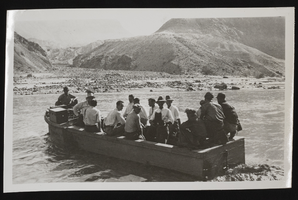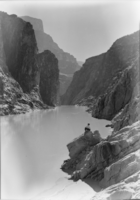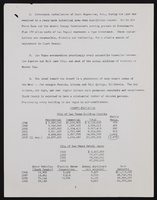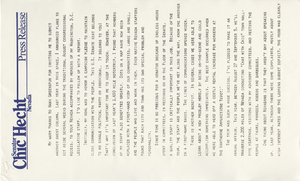Search the Special Collections and Archives Portal
Search Results
Mary Habbart oral history interview
Identifier
Abstract
Oral history interview with Mary Habbart conducted by David R. Patt on March 07, 1975 for the Ralph Roske Oral History Project on Early Las Vegas. This interview offers an overview of life in Las Vegas, Nevada in the early days, which included: atomic testing, floods, prostitution on Block 16, early Fremont Street and Duck Creek. Also discussed during this interview: Sunset Park, The Roosevelts, Bugsy Siegel, local government and the Hoover Dam.
Archival Collection

Photograph of men in a boat, Colorado River, approximately 1931-1936
Date
Archival Collection
Description
Image

Transcript of interview with Adele Baratz by Steve McClenachan, March 3-4, 1979
Date
Archival Collection
Description
Interview with Adele Baratz by Steve McClenachan on March 3 and 4, 1979. In this interview, Baratz talks about growing up in Las Vegas and her her schooling. She graduated from Las Vegas High School in 1944, and discusses the rationing that took place during World War II. She went to Maryland for nursing school and returned to Las Vegas in 1947. She describes some of the hotels and casinos, and tells the story of her father trading property for an automobile in 1935. She also recalls the building of Hoover Dam, swimming in local pools, and going to Mount Charleston in the winter. The interviewer asks her about travel between Las Vegas and California and the impact of Atlantic City on Las Vegas tourism. Baratz then talks about her nursing career and starting a re-certification program in 1974 and the different hospitals in the area.
Text

Film transparency of the Colorado River, circa 1930s-1950s
Date
Archival Collection
Description
Image
Eddie Ernest Buxton oral history interview
Identifier
Abstract
Oral history interview with Eddie Buxton conducted by Bernard D. Vardiman on March 30, 1976 for the Ralph Roske Oral History Project on Early Las Vegas. Buxton describes the significance of some of his ancestors, including Ernest May, who was the first law enforcement officer in Las Vegas, Nevada killed in the line of duty in 1933. Buxton also recalls the development of both Las Vegas and North Las Vegas, going to school in the city, and his father’s work on Hoover Dam.
Archival Collection
Lawrence Hawley oral history interview
Identifier
Abstract
Oral history interview with Lawrence Hawley conducted by Andy Sturgeon on March 13, 1981 for the Ralph Roske Oral History Project on Early Las Vegas. The two discuss how Hawley first came to Nevada, as well as his personal family history. Hawley describes Hoover Dam as it was being built, the effects of the Depression on Nevada, and how Las Vegas has grown in size. Hawley also discusses liquor laws and how practicing law has changed since he first moved to Nevada.
Archival Collection
Cliff Segerblom Artwork
Identifier
Abstract
The Cliff Segerblom Artwork contains four pieces of Segerblom's artwork. One painting of a desert home in Nelson, Nevada titled "Afternoon in Nelson" from 1940, one drawing of the USS Hornet from 1969, and two watercolor paintings of Lake Mead and Sunrise Mountain. The First Annual Southern Nevada Art Exhibit originally displayed "Afternoon in Nelson" in Las Vegas, Nevada between January 27 and 28 in 1940. The USS Hornet drawing was created November 1969, depicting a fighter aircraft aboard the USS Hornet at Apollo 12's splashdown. The two watercolors were donated to the University in 1962 by the Clark County Panhellenic Association.
Archival Collection



